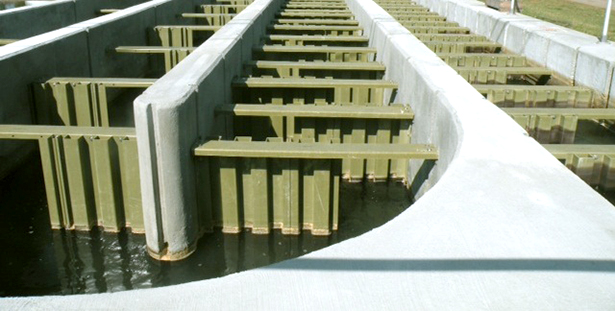Case Study: Composites Aid Coagulation and Flocculation Processes

 Coagulation and flocculation play vital roles in the primary treatment phase of water and wastewater treatment prior to sedimentation and filtration processes.
Coagulation and flocculation play vital roles in the primary treatment phase of water and wastewater treatment prior to sedimentation and filtration processes.
During primary treatment phases, baffle panels are typically introduced for underwater flow controls. Prior to the introduction of composites, baffle panels were constructed with traditional materials such as steel, concrete, and sometimes wood. All of these materials have short lifespans as constant water volumes expose these materials to high percentages of chemical and organic matter, leading to accelerated corrosion and rot. This results in deteriorating functional capacities.
With the introduction of pultruded fiberglass, Strongwell’s Baffle Wall systems have demonstrated the ability to yield maximum potable water and wastewater treatment flow during the process of coagulation. As not all FRP is created equal, Strongwell’s FRP possesses leading industry qualities such as high corrosion resistance, excellent strength-to-weight ratio, and UV resistance for both outdoor and disinfection applications.
| TECHNICAL DATA |
|---|
| Product: FRP Baflle Wall System |
| Process: Pultrusion |
Materials & Sizes:
|
| For: Crowder Construction / Harrington Industrial Plastics |
| User: South Carolina water treatment facility |
In a water treatment facility in South Carolina, redwood baffle panels and concrete slabs had deteriorated beyond repair. Concerned with life cycle costs attributing from ongoing maintenance, the facility engineers decided to replace all of the traditional baffle panels with FRP in multiple phases over an 18-month period.
Engineers have begun to utilize lightweight FRP baffle panels for underwater flow control applications. In addition, the longer life cycle of the FRP and new design systems give engineers great flexibility in both new and retrofit projects for aeration chambers, contact chambers, and retention basins.